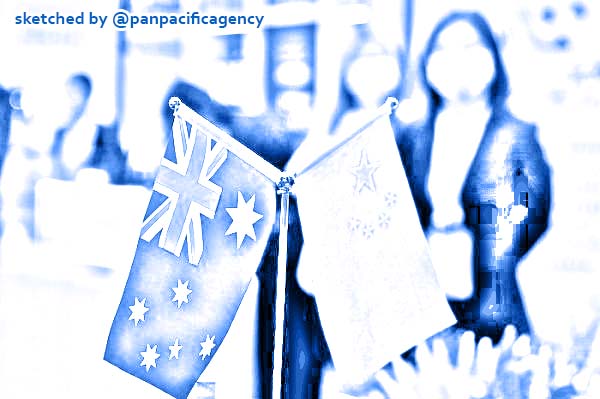Chinese investment in Australia plunges to lowest level since at least 2007

Australian and Chinese flags are seen at the third China International Import Expo (CIIE) in Shanghai, China 6 November, 2020 (Photo: Reuters/Aly Song). Sketched by the Pan Pacific Agency.
SYDNEY, Jun 28, 2022, ST. A diplomatic falling out between Australia and China has taken a heavy toll on Chinese investment, which has plunged to the lowest level since at least 2007. A new report by KPMG and the University of Sydney found that Chinese companies invested just US$585 million (S$811 million) in Australia in 2021, down from a peak of US$16.2 billion in 2008, The Straits Times reported.
The report shows the plunge in investment began in 2017, just as relations between the pair turned sour.
In the four years to 2017, China invested more than US$40 billion in Australia – making Australia one of the largest destinations for Chinese investment. But Chinese investment in Australia in the four years from 2018 amounted to just US$11 billion.
According to Chinese government data, China’s foreign investment had not dropped during the Covid-19 pandemic and increased in both 2020 and 2021.
The falling out in ties between Beijing and Canberra followed China’s anger at a range of measures, including Australia’s foreign interference laws, its ban on Chinese telecommunications giant Huawei from participating in its 5G roll-out, and its call for an inquiry into the origins of Covid-19.
Despite signs of a thaw since a recent change of government in Australia, the new Australian Prime Minister, Mr Anthony Albanese, has made it clear he will not make concessions to Beijing.
In comments that riled China, Mr Albanese on Tuesday (June 28) warned that China should learn lessons from Russian President Vladimir Putin’s “strategic failure” in invading Ukraine.
“Russia’s invasion of Ukraine can be seen as a strategic failure,” he told the Australian Financial Review. “If their objective was to enhance their power very quickly then that hasn’t occurred. The resistance of Ukraine has brought democratic nations closer together which have a shared commitment to rules-based, international order.”
Asked whether the global response to the Ukraine invasion had lessons for Beijing, which seeks “reunification” with Taiwan, Mr Albanese said the invasion “had shown attempts to impose change by force on a sovereign country meets resistance”.
The comments drew criticism from Beijing, which said on Tuesday that Taiwan was “not a sovereign country” and therefore could not be compared to Ukraine.
“Taiwan is by no means Ukraine,” Chinese Foreign Ministry spokesman Zhao Lijian told a regular press briefing in Beijing on Tuesday.
“They are not comparable at all… We hope relevant politicians can avoid making irresponsible remarks.”
The clash came as Australia and China made moves in recent weeks to improve ties. Earlier this month, Australian Defence Minister Richard Marles met his Chinese counterpart, General Wei Fenghe, on the sidelines of the Shangri-La Dialogue in Singapore, marking the first high-level official contact between the two countries in more than two years.
But Mr Albanese, a Labor MP, has insisted he will continue the Liberal-National Coalition’s approach to China and will speak out against Chinese human rights violations and any aggressive territorial moves. But he has signalled that he is open to dialogue and will adopt less combative rhetoric than his predecessor, Mr Scott Morrison.
As ties deteriorated in the past two years, China – Australia’s largest trading partner – imposed trade sanctions on A$20 billion (S$19.3 billion) worth of Australian beef, barley, wine and other products.
The latest report on declining Chinese investment in Australia suggested that the falling out has also affected China’s willingness to invest in Australia. The rush by Chinese firms from the 2000s onwards to buy Australian farmland, mining and energy businesses, and property and infrastructure assets appears to have ended.
But the slowdown may also have been affected by Australian curbs on foreign investment, particularly measures aimed at preventing investment in assets deemed significant to national security. Canberra has become increasingly worried about Chinese investment in sensitive assets.
The new Labor government is set to review a controversial 99-year lease in 2015 of a port in the northern city of Darwin to a Chinese firm – a deal that angered the United States, which stations marines at a nearby base.
Professor Hans Hendrischke, an expert on the Chinese economy from the University of Sydney who co-authored the investment report, said he was surprised by the fast rate at which Chinese investment had dropped.
“The decline really has now gone to a level where there is literally none or very little investment coming from China,” he told ABC News.